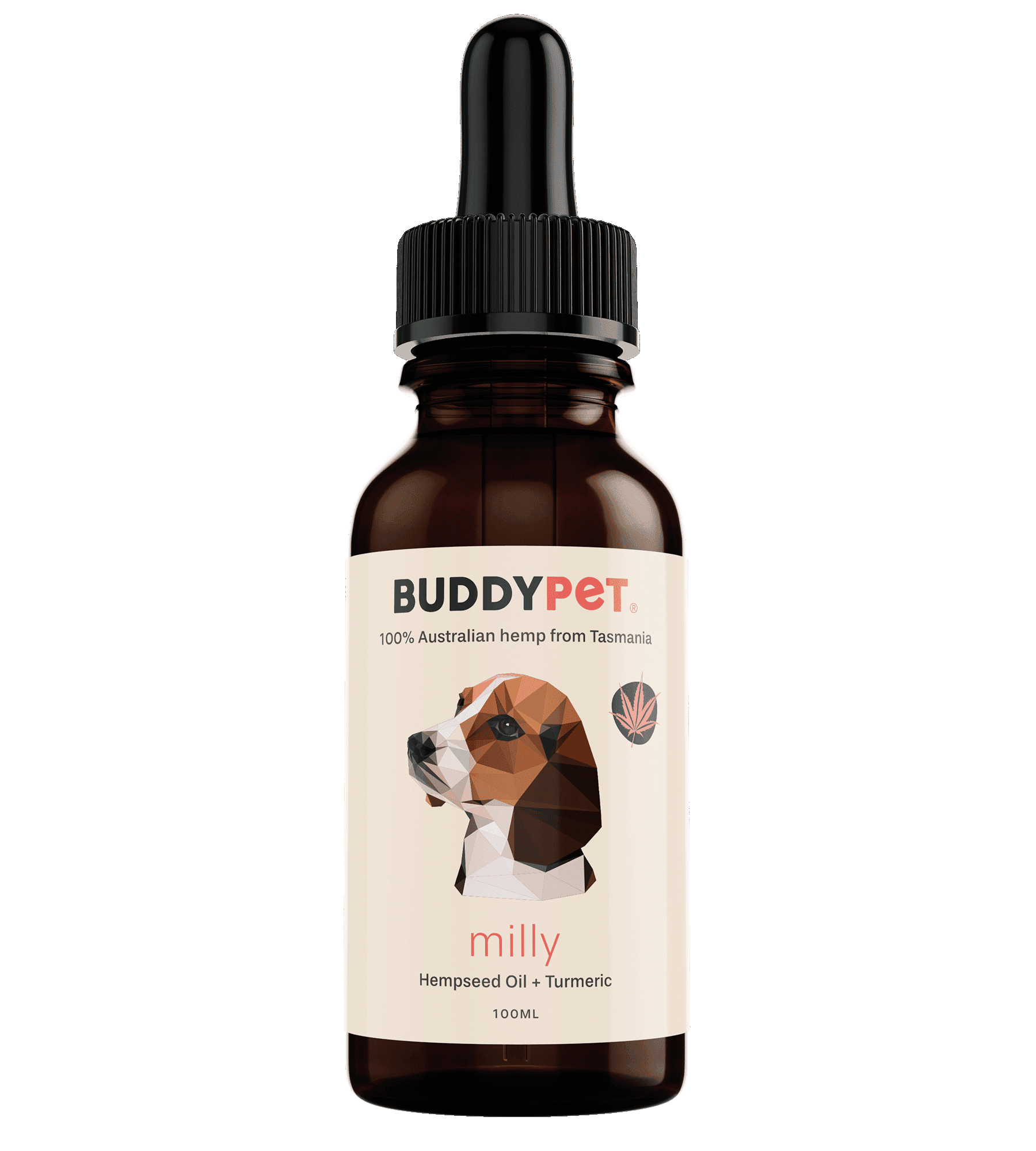Cat cancer is a growing concern for pet owners, especially as their feline companions age. Understanding the symptoms, treatments, and preventive measures can help you better care for your cat and potentially extend their lifespan.
This blog will cover everything you need to know about cat cancer, including types, symptoms, and ways to support your cat’s health. Additionally, we will introduce a natural product,Luna Fish Oil, that may help prevent and manage cancer in senior cats.
What is Cat Cancer?
Cancer in cats occurs when cells within the body begin to grow uncontrollably, leading to the formation of tumors or abnormal tissue masses. There are many types of cancer, and it can affect various organs in your cat's body. Early detection is crucial for effective treatment and management.
Common Types of Cancer in Cats
- Lymphoma: One of the most common types of cat cancer, lymphoma affects the lymphatic system. It can appear in the intestines (intestinal lymphoma), chest, or other lymph nodes.
- Squamous Cell Carcinoma (SCC): A form of skin cancer that often appears on the head, nose, or ears. It's more common in white or light-colored cats who are frequently exposed to the sun.
- Mammary Gland Tumors: Breast cancer in cats, more commonly seen in unspayed females. This form of cancer is aggressive and can spread quickly to other organs.
- Fibrosarcoma: A type of soft tissue cancer that forms under the skin or in deeper tissues. It can be caused by infections or injuries.
- Bone Cancer (Osteosarcoma): Though rare in cats, bone cancer can develop in their limbs and cause severe pain and lameness.
What Causes Cancer in Cats?

While the exact cause of cancer in cats is often unknown, several factors can increase the risk:
- Genetics: Some cats may be predisposed to certain types of cancer based on their genetic makeup.
- Age: Older cats are more likely to develop cancer, as their cells are more prone to mutations over time.
- Environmental Toxins: Exposure to pesticides, tobacco smoke, and other chemicals can increase a cat's cancer risk.
- Viruses: Certain viruses, like feline leukemia virus (FeLV) and feline immunodeficiency virus (FIV), have been linked to higher rates of cancer in cats.
Signs and Symptoms of Cat Cancer
Detecting cancer in cats early can make a significant difference in their treatment outcome. Some common symptoms to watch for include:
- Lumps or masses: Any unusual lumps, especially those that grow or change in texture, should be checked by a vet.
- Weight loss: Unexplained weight loss can be a sign of an underlying issue, including cancer.
- Loss of appetite: Cats that suddenly lose interest in food or struggle to eat may be suffering from a health condition.
- Lethargy: Reduced energy levels, decreased playfulness, and prolonged sleep can be signs of illness.
- Difficulty breathing: Respiratory issues could indicate chest tumors or fluid buildup due to cancer.
- Sores that do not heal: Non-healing sores, particularly on the skin, could be a sign of skin cancer.
- Vomiting or diarrhea: Persistent digestive issues, especially combined with weight loss, can indicate intestinal cancer.
If you notice any of these signs, it’s essential to schedule a vet visit as soon as possible. Early diagnosis can lead to more treatment options and better outcomes.
How is Cat Cancer Diagnosed?

When cancer is suspected, your vet may perform various diagnostic tests:
- Biopsy: A tissue sample from the affected area can help determine if the cells are cancerous.
- X-rays or Ultrasounds: Imaging techniques are used to detect tumors or abnormalities within your cat’s body.
- Blood Tests: These can reveal signs of organ dysfunction, infections, or other health issues that may be related to cancer.
- CT Scan or MRI: In some cases, advanced imaging may be necessary to get a clearer picture of the cancer’s extent.
Treatment Options for Cat Cancer
The treatment of cat cancer depends on the type, location, and stage of the disease. Some common treatment methods include:
- Surgery: If the tumor is localized, surgical removal is often the first line of treatment.
- Chemotherapy: This involves using drugs to kill cancer cells or slow their growth. While it is less aggressive in cats than in humans, it can still be effective for certain types of cancer.
- Radiation Therapy: High-energy radiation can be used to shrink tumors or kill cancer cells. This is particularly effective for cancers like squamous cell carcinoma.
- Palliative Care: For cats with advanced cancer, palliative care focuses on making them comfortable and managing symptoms like pain or difficulty breathing.
Preventing Cat Cancer: Tips for Cat Owners

While not all cancers can be prevented, there are steps you can take to reduce your cat’s risk:
- Spay or Neuter: Spaying female cats can significantly lower the risk of mammary gland tumors, while neutering males may reduce their risk of testicular cancer.
- Healthy Diet: Feeding your cat a balanced, nutritious diet supports their immune system and overall health, reducing the risk of various diseases.
- Minimize Exposure to Toxins: Avoid exposing your cat to harmful chemicals, including tobacco smoke, pesticides, and certain cleaning products.
- Regular Veterinary Checkups: Routine vet visits allow for early detection of health issues, including cancer.
How Cat Cancer Differs from Cancer in Dogs
While dogs and cats can both develop cancer, the disease often manifests differently between the species. Cats are known for hiding pain and illness, making early detection more difficult. In contrast, dogs tend to show more outward symptoms when they're unwell. Here's how cat cancer differs from cancer in dogs:
- Types of Cancer: Cats are more prone to certain cancers like lymphoma and squamous cell carcinoma, while dogs are more likely to develop bone cancer or mast cell tumors.
- Symptoms: Cats are more subtle in showing signs of illness, and they may not display noticeable symptoms until the cancer is in an advanced stage. In dogs, symptoms like limping or visible lumps often prompt quicker detection.
- Prognosis: Because cancer is often detected later in cats, their prognosis may be less favorable compared to dogs, who may receive earlier treatment.
Understanding these differences can help you stay alert to the more subtle signs of illness in your cat and seek veterinary care early.
The Role of Nutrition in Cancer Prevention
Nutrition plays a critical role in keeping your cat healthy and potentially reducing their cancer risk. Providing your cat with a diet rich in antioxidants, omega-3 fatty acids, and high-quality protein can strengthen their immune system and help combat inflammation, a known contributor to cancer.
Key Nutrients for Cancer Prevention
- Omega-3 Fatty Acids: Found in fish oils, omega-3s have powerful anti-inflammatory properties. They can reduce chronic inflammation, which is often linked to cancer development.
- Antioxidants: Vitamins C and E, as well as selenium, can neutralize free radicals that damage cells and contribute to cancer.
- Protein: High-quality protein is essential for maintaining muscle mass and overall strength, especially in cats undergoing cancer treatment.
Foods That May Help
- Salmon or Tuna: Rich in omega-3 fatty acids, these fish can be a healthy addition to your cat’s diet in moderation.
- Pumpkin: Packed with fiber and antioxidants, pumpkin supports digestive health and can help prevent obesity, a known risk factor for cancer.
- Blueberries: High in antioxidants, blueberries help combat oxidative stress, which is linked to aging and cancer.
Feeding your cat a balanced diet can be a proactive step toward preventing cancer, especially when combined with supplements likeLuna Fish Oil.
The Importance of Exercise and Mental Stimulation
Just like humans, cats benefit from regular exercise and mental stimulation. Keeping your cat active can improve their overall health and may help prevent diseases, including cancer. Cats that are regularly engaged in play and mental challenges are less likely to become overweight, which reduces their risk of developing cancer.
Exercise Tips for Your Cat
- Interactive Toys: Laser pointers, feather wands, and electronic toys can keep your cat active and entertained.
- Climbing Structures: Cat trees and shelves give your feline friend a chance to climb and explore, promoting physical activity.
- Puzzle Feeders: These can mentally stimulate your cat and encourage slow feeding, which is beneficial for weight management.
A healthy weight, combined with mental and physical activity, can enhance your cat's overall quality of life and reduce their risk of many diseases, including cancer.
Natural Supplements to Support Cat Health

While medical treatment is essential, natural supplements like fish oil can support your cat’s overall health and potentially help prevent cancer. One product gaining attention for its health benefits isLuna Fish Oil for Health Support in Senior Cats.
Introducing Luna Fish Oil
BUDDYPET Luna is a blend of fish oil and hemp seed oil, designed to naturally support your senior cat’s health. This powerful combination works in several ways to promote your cat’s well-being, particularly in their later years:
- Fish Oil: Rich in omega-3 fatty acids, fish oil acts as an anti-inflammatory agent, reducing chronic inflammation—a factor that can contribute to cancer.
- Hemp Seed Oil: Hemp seed oil contains antioxidants that help reduce oxidative stress, which is linked to aging and cancer development.
Benefits of Luna for Senior Cats
Luna offers a range of benefits for senior cats, especially those with chronic conditions like arthritis or kidney disease:
- Reduces Inflammation: The omega-3 fatty acids in fish oil, particularly EPA, help alleviate inflammation in joints and organs, which can reduce the risk of diseases like cancer.
- Supports Immune Function: Luna can boost your cat’s immune system by improving gut health and reducing oxidative stress.
- Slows Aging: The antioxidants in hemp seed oil help slow the aging process, which can decrease the likelihood of cancer in senior cats.
- Eases Pain: For cats with arthritis or other inflammatory conditions, Luna provides natural pain relief, improving mobility and quality of life.
- Promotes Kidney Health: Omega-3 fatty acids may help slow the progression of kidney disease, which is common in older cats.
How to Use Luna
To incorporate Luna into your cat’s daily routine:
- Start with1 drop per day, gradually increasing to3 drops a day over 10 days.
- Add the drops directly to your cat’s food for easy administration.
Ingredients
- Fish Oil: High in omega-3 fatty acids (DHA and EPA).
- Hemp Seed Oil: Packed with antioxidants and essential fatty acids.
Customer Reviews
Here’s what some satisfied customers have to say aboutLuna:
- “Since we started our 16-year-old cat on Luna, he's more active and seems like his younger self again.” – Louise
- “Luna has been a game-changer for my 14-year-old cat. He's calmer and no longer hides from visitors.” – Z.
- “Both of my cats, diagnosed with early-stage heart disease, have shown improvement since starting Luna.” – Sharen Mitchell
Why Choose Luna?
- 100% Natural Ingredients: Luna is made from organic, GMO-free ingredients.
- Quality Assurance: Manufactured in Australia, ensuring high-quality and sustainable production.
- Money-Back Guarantee: If you're not satisfied, you can return it for a full refund.
Luna Fish Oil for Health Support in Senior Cats could be a valuable addition to your cat’s care routine, offering potential preventive benefits against cancer while promoting overall health. For more information or to purchase, visit BUDDYPET Luna.
Frequently Asked Questions (FAQ) About Cat Cancer and Luna Fish Oil
1. What are the common types of cancer in cats?
Common types includelymphoma,squamous cell carcinoma (SCC),mammary gland tumors,fibrosarcoma, andbone cancer (osteosarcoma).
2. What are the symptoms of cancer in cats?
Signs includeweight loss,lumps or masses,loss of appetite,lethargy,vomiting, andnon-healing sores.
3. How is cancer in cats diagnosed?
Diagnosis involvesbiopsies,X-rays,blood tests, and possiblyCT scans or MRIs.
4. How can Luna Fish Oil help my cat?
Luna Fish Oil supports senior cats by reducinginflammation, boostingimmune health, and alleviatingpain from chronic conditions. Its anti-inflammatory properties may help prevent conditions like cancer.
5. How do I administer Luna Fish Oil to my cat?
Start with1 drop per day in their food, gradually increasing to3 drops a day over 10 days.
Conclusion
Caring for a cat with cancer or taking steps to prevent it requires vigilance, regular vet checkups, and a proactive approach to their overall health. By understanding the signs of cancer and integrating natural supplements likeLuna Fish Oil, you can support your feline companion in their golden years. Always consult with your vet before starting any new treatments or supplements to ensure the best care for your cat.
If you have any questions or need further assistance, feel free to reach out toBUDDYPET.





